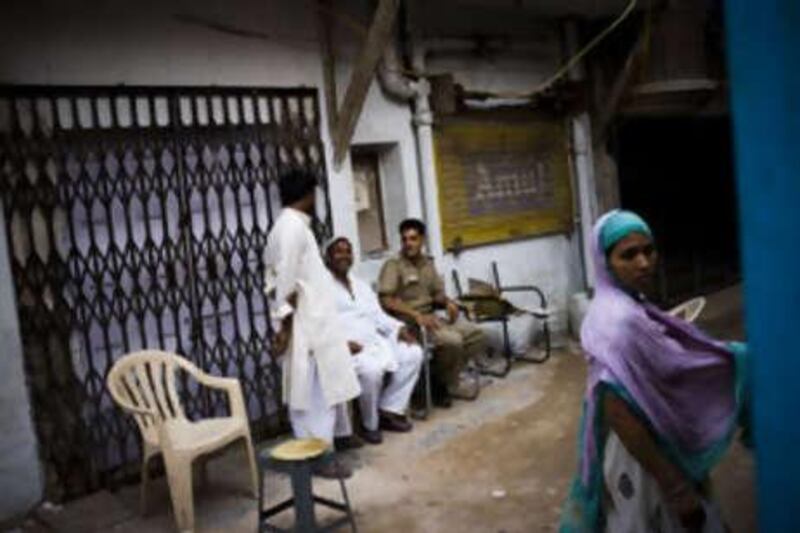NEW DELHI // Umar Khalid felt it was his duty to attend the boy's funeral. A devout Muslim, he had lived his entire life in Jamia Nagar - the same New Delhi neighbourhood where Mohammed Sajid, 17, was shot and killed in a crumbling apartment block just two days earlier. But Mr Khalid could not bring himself to enter the chamber where Mohammed's body was to be bathed.
"I was traumatised," he said. "I was too scared to go inside." The dead boy's face said it all. At least seven bullets had pierced his skull; three more had penetrated his upper body. The bullets came from police guns. Since last Monday's funeral, Mr Khalid, 21, a student at the University of Delhi, has been attending rallies demanding an investigation into the boy's death, distributing flyers - and finding his political voice.
"On that day, I decided I was going to do what I can," he said. "We are not anti-India. We are anti-government." On Sept 19, a tactical team descended on a neighbourhood apartment, claiming it was a hideout for the Indian Mujahideen - a militant cell taking responsibility for fatal bombings across the country this summer. By the end of the encounter, the alleged mastermind of the month's blasts in New Delhi, Atif Ameen, was dead, along with his aide, Mohammed. Several others were arrested or managed to flee the scene.
Maintaining that they had reliable evidence implicating the young men, police officials called the Jamia Nagar raid a triumph over the shadowy Indian Mujahideen - even if the crowds gathered outside the apartment at the time were already calling the encounter a fake. To that charge, Rajan Bhagat, the Delhi police spokesman, said: "We don't look at a suspect's religion. We work on positive leads."
As for those leads, investigators have released little information to the public with Delhi police commissioner, YS Dadwal, telling reporters: "Blasts are not a cricket match where I should give you a running commentary." A fact-finding committee from the People's Union of Civil Liberties, People's Union for Democratic Rights and Janhastakshep, a human rights group, have called the incident a "fake encounter" staged by police.
Muslim leaders are drawing their own conclusions. The suspected terrorists, for example, seemed to live a very public life in the neighbourhood's student quarter. The so-called mastermind, Mr Ameen, kept a detailed profile on a social networking website, where his favourite movies included several patriotic films. He also listed his full contact details, including his home address. "Why would they make that information so easily available if they were involved in this plot?" Mr Khalid asked.
And perhaps the most searing question, why did police shoot a 17 year old so many times in the head? "We think he was just sitting and someone shot him," said Shahzad Alam, 40, an engineer who lives in the neighbourhood. Ironically, police may have unleashed the same elements they are trying to quash. "That's going to alienate a section of society further," Mr Khalid said. "And it's probably going to radicalise that section."
His frustration is aimed not only at the government, but India's middle class - a burgeoning segment of the population that Mr Khalid described as being too cocooned in shopping malls and air-conditioned SUVs to question official accounts. "Ever since capitalism has come to India, the middle class has lost its conscience. It wakes up when there is a little bit of information. Then it goes back to sleep."
Jamia Nagar's shambling collection of meat shops, fruit vendors and hardware stores has long been a Muslim enclave in the heart of the capital. It is only a feeling of isolation from the rest of the city, Mr Khalid noted, that keeps Muslims crowded together. "They call this a mini Pakistan," Mr Khalid said. "The only reason why we live here is because of the alienation. You never know when there might be a riot."
Since the communal bloodbath of 1947, when partition pitched Hindu against Muslims, relations between the faiths have always been sensitive. In 2002, a train caught fire in Gujarat, killing 58 Hindu activists on board. Although unfounded, rumours that Muslims had firebombed the train found a ready ear among Hindu nationalists. Days later, an angry mob attacked Muslims in the central state, destroying a mosque and killing 70 people.
This time, however, security analysts do not expect a communal backlash, especially since the Indian Mujahideen has been condemned by both Muslims and Hindus. But some argue that rooting out militants must involve a police presence in Muslim communities - whether it infuriates local sensibilities or not. "We'll just have to have that intelligence within the Muslim community," said Bharat Karnad, a security analyst with the New Delhi-based Centre for Policy Research. "We'll have to nurture the informer network so that the police are on the ball and know of things before they actually happen.
"In some sense, they are trying to do the best they can. But this particular government, I'm afraid, is stuck on being politically correct at the expense of being effective." ccotroneo@thenational.ae





